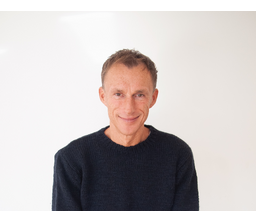Prof. Dr. Oliver Baron
Dr. phil.
Faculty of Cultural Sciences
Cologne International School of Design

Teaching disciplines
- Design and Economy
Research fields
-
Aesthetics. Critical Theory
Projects / Cooperations
-
Let´s Playhttp://kisd.de/letsplay/
Two cultures, two languages, two socio-economic environments, two primary schools: "Let’s Play" has allowed children from South Africa and Germany to design their own video games together. In doing so, we were also interested in the overarching question of how digital games can promote intercultural learning in an international context. To this end, we, in collaboration with the Learning Innovation Design Lab, an NGO from Cape Town, as well as one primary school in South Africa (St. Mary’s Primary School, Gardens) and one in Germany (Grundschule am Koppenplatz, Berlin), set up a "Play to Learn Lab," in which students could independently use social media to get to know each other and collaborate. On-site, we organized "Game Jams," in which the students, supported by students from TH Köln, were challenged to develop their own game ideas, test them in practice, and digitally implement them with suitable software. Primary Project Goals: > Intercultural Learning. Students from two continents get to know each other. They explore the differences and similarities of their cultures and daily lives. They develop strategies to break down language and cultural barriers. They connect and form new friendships. > Technology and Media Literacy. Through play, the students gain their first programming experiences. They develop an understanding of how code works and how they can apply and share their knowledge. They also develop creative ideas and a critical relationship with their digital environment to become responsible citizens. Project Partners: > Prof. Andreas Muxel, KISD > Learning Innovation Design Lab, Cape Town > St. Mary’s Primary School in Gardens, Cape Town > Grundschule am Koppenplatz, Berlin -
Urban Topologies of Transformation
The aim of this project is to use the research and visualization techniques of design to make visible the processes of change in metropolises of countries whose economic systems have shifted from centrally planned to market-oriented principles. The starting point for these investigations were Berlin and Hanoi. In both cases, it became evident that the profound economic and political transformation was accompanied, among other things, by far-reaching phenomena of nostalgia, the manifestations of which differ in telling ways between Europe and Asia. Design-theoretical and cultural-scientific interpretations of these differences have shown that they enable transcontinental intercultural comparisons, the identification of culture-specific patterns, and, where applicable, the development of forecasting capabilities. For these purposes, the research was extended in the following years to cities such as Moscow, Beijing, Havana, and Dar Es Salaam. The project is understood as a "work in progress." A representative example of student work can be seen in the video below by Hannes Hummel [https://vimeo.com/hanneshummel/hideaways]. Project Partners: > Prof. Nguyễn Thế Sơn, Vietnam Fine Arts University, Hanoi > Goethe-Institut Hanoi -
Rethinking Design Education
This joint research initiative between KISD and UNAM in Mexico City aims to develop an applied model for a new form of intercultural design education in a participatory way—one that strengthens local structures and incorporates traditional knowledge about the well-being of communities. To achieve this, we seek to gradually redefine the relationship between art and design, industry and craft, tradition and future. We work in close partnership with local communities, artisans, and designers, involving students from both universities in the process right from the start. Through this, students gain both theoretical, methodological, and practical research skills, as well as distinct intercultural competence—thanks to an intensive engagement with different design traditions in everyday life. Specifically, they develop research questions for sub-projects and carry them out independently under the guidance of the project leadership. Mandatory steps in the process include: - Theoretical engagement with the research topic - Exploration of the history and culture of the partner country - Formulation of a research question - Selection of a suitable research method - Identification of contacts, research subjects, etc. - Execution of fieldwork/data collection - Analysis of the collected material - Preparation and presentation of the research findings. Project Partner: > Prof. Diego Alatorre Guzman, UNAM, Mexico City
Publications
-
Dissonanz als ästhetische Kategorie
Oliver Baron, 2008, Publisher: Wilhelm Fink Verlag
-
Design und Ökonomie
Oliver Baron. Mark Pfaff., 2014, Publisher: UTB
-
Ist Ironie zu überwinden? Ein Fallbeispiel.
Oliver Baron, 2007, Publisher: Stefanie Diekmann, Thomas Khurana (Hg.): Latenz. Kadmos Kulturverlag, Berlin
-
Die Paradoxie der Kunstregel
Oliver Baron, 2010, Publisher: In: Holger Simon, Christian Filk (Hg.): Kunstkommunikation. Wie ist Kunst möglich? Kadmos Kulturverlag, Berlin
-
Nietzsches Spur in Adornos „Ästhetischer Theorie"
Oliver Baron, 2011, Publisher: In: Rüdiger Schmidt-Grépály, Stefan Wilke (Hg.): Moderne und Historizität. Bauhaus Universitätsverlag
-
Ästhetische Intensität
Oliver Baron, 2018, Publisher: In: Ernest W.B. Lüttich, Meher Boot, Vibha Surana (Hg.): Cross Cultural Communication. Kooperative Ästhetik(en). Peter Lang Verlag
-
Industrie und Handel
Oliver Baron, 2025, Publisher: In: Oliver Ruf, Thomas Hensel, Lars C. Grabbe (HG.): Handbuch Designwissenschaft. Geschichte, Theorie, Praxis. J.B. Metzler Verlag
Talks
-
All power to imagination
Keynote speach at the "International Design Development and Research Conference. Kapstadt, Südafrika, 02–05.09.2012
2012 -
Design and Aesthetics
At: Fast Forward: Design Practice and Education in the Near Future. Glasgow School of Arts, Schottland, 13.03.2014
2014 -
Looking at Critical Design through philosophical spectacles
At: Beirut Design Week, Libanon, 19.05.2017
2017 -
Die ökonomische Funktion des Designs
Ringvorlesung: Wirtschaft und Design an der ZHdK, 30.09.2024
2024
